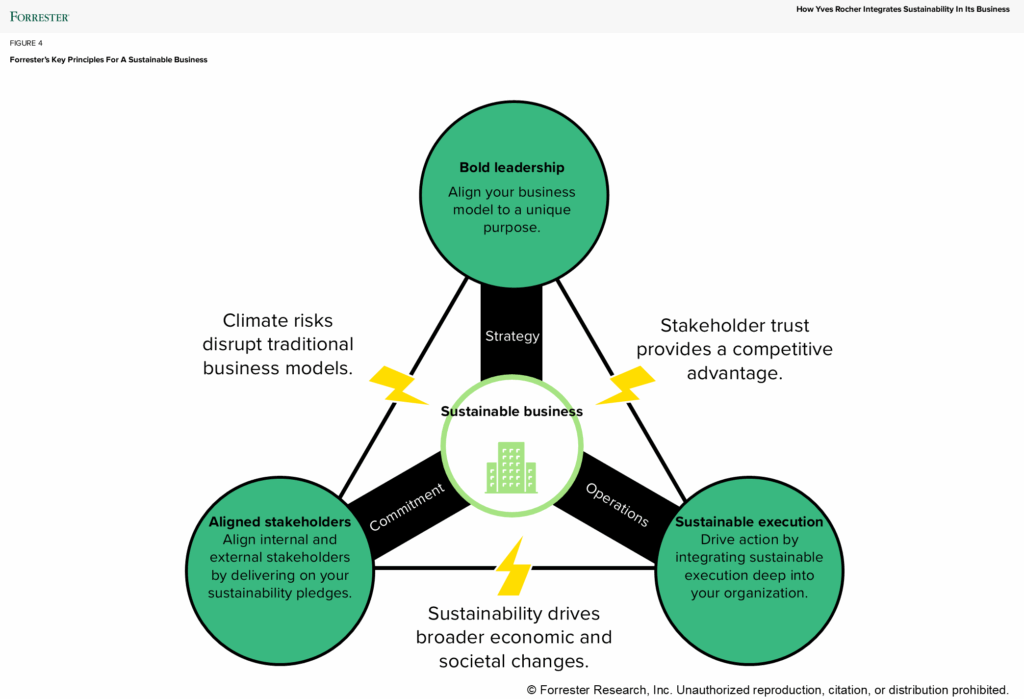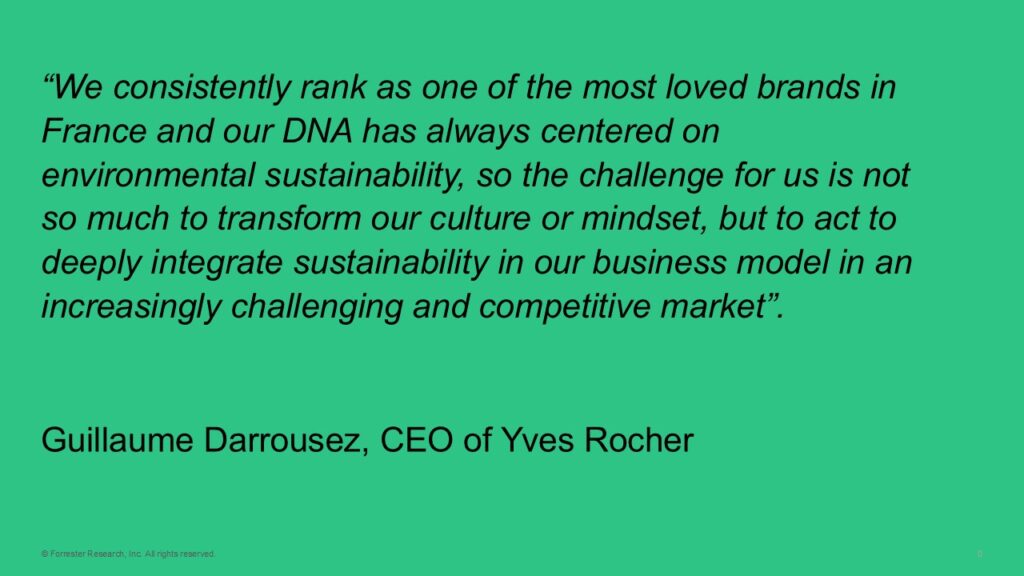How Yves Rocher Integrates Sustainability Into Its Business
After studying for a certificate in business sustainability management from the Cambridge Institute for Sustainability Leadership, I pivoted part of my research at Forrester to the intersection of marketing, AI innovation, and environmental sustainability.
Back in 2021, I interviewed dozens of leaders about sustainability disruption and how to transform their business. I interviewed Guy Flament, then CEO of the Yves Rocher brand, and Jean-David Schwartz, then deputy CEO of transformation and sustainability at Group Rocher. Their stories helped me articulate how sustainability is not about ticking the environmental, social, and governance (ESG) regulation box but about building a strategy that integrates sustainability into business execution in every country and every function across your organization, enabling it to differentiate and increase profitability.
Sustainability Transformation Demands Three Key Principles
I wrote a first report explaining that to embrace a multiyear transformation journey toward sustainability, traditional firms must embrace three key principles, summarized in the graphic below:

Many firms have started their sustainable transformation journey, and many of them succeed at being both sustainable and profitable. It can be a bumpy road but is also a way to gain a competitive advantage. But because of the current backlash toward ESG and even environmental science denial, we lack examples of large firms that are pivoting their approach to become more sustainable.
Indeed, more often than not, I come across sustainability-born companies, green startups, or regenerative companies — whatever you call them — that do not have any legacy. Don’t get me wrong: It is great to see new players that are sustainable by design and that can hopefully challenge and disrupt existing players.
The Challenge Is For Global Firms To Integrate Sustainability Into Their Business
Given their massive impact on the environment, existing firms — especially global ones — have to transform to reduce their carbon footprint and stay within planet boundaries. The challenge is to do so while not losing competitiveness and while maintaining profitability. When they succeed, many firms prefer not to be too vocal: 75% of CMOs we surveyed in Q1 2025 said that they would like to communicate more on their green initiatives but fear greenwashing!
I interviewed Guillaume Darrousez, new CEO of the Yves Rocher brand since the end of 2023 (for those of you who understand French, here is the link to the video at the B.Better conference), and thought it would be a great idea to write a full case study on how a leading brand in the French beauty market and a global cosmetics player with a presence in more than 90 countries operates and executes sustainability in its business.

Indeed, in the very competitive beauty market led by giants such as L’Oréal and disrupted by sustainable-born startups, Yves Rocher faces both a significant challenge and opportunity. It must live up to its strong environmental DNA, transform the brand, and accelerate the execution of sustainability in its business operations, all while augmenting profitability.
Yves Rocher Case Study Highlights
The case study highlights how Yves Rocher:
- Embedded sustainability KPIs into its overall OKRs. Sustainability is an integral part of the nine objectives and key results (OKRs) of its business management approach, with three KPIs centered on sustainability in 2024.
- Launched the “act beautiful” program. It is a pragmatic approach with 10 acts to demonstrate its commitment to a more sustainable beauty industry, affecting many functions and business units.
- Doubled its sales of “committed gestures products.” Yves Rocher has reached its objective of doubling its sales of “committed gestures products,” reaching 4.3% in volume of its total product mix and 1.8 million clients in 2024. A committed gesture product is defined as a product that drastically reduces its environmental footprint, respects all of Yves Rocher’s sustainable-product criteria, and promotes new usage, encouraging a more frugal and sustainable consumption behavior.
- Reduced its carbon footprint. In 2024, Yves Rocher succeeded in reducing its carbon footprint by 11% from 2023. Contrary to firms that commit to reducing their relative carbon intensity (tons of CO2 per product sold), Yves Rocher has committed to reducing its absolute greenhouse-gas emissions by 30%, from 107,926 tons of CO2-equivalent (TeqCO2) in 2022 to 75,500 TeqCO2 by 2030.
The report shares how a global beauty brand with a strong DNA around nature has gone further to integrate sustainability deeply into its business strategy and execution.
Clients who wants to know more can access the full report and set up some time to discuss the implications for their own company.
Special thanks to Alexandra Ferré, chief impact and CSR (corporate social responsibility) officer, and to the individuals in the executive team from Yves Rocher and Groupe Rocher who generously gave their time during the research for this report.
